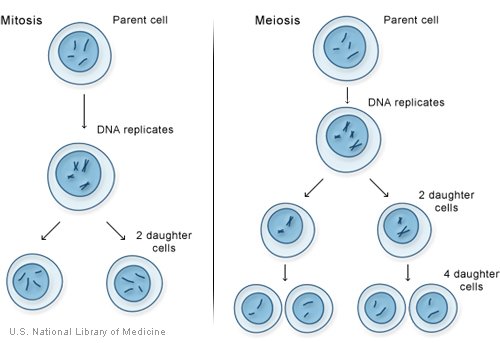Thursday, January 10, 2008
pg.252
1. What chemicals regulate the cell cycle? How do they work?
The chemicals that regulate the cell cycle are cyclins. Cyclins regulate the timing of the cell cycle in eukaryotic cells.
2. What happens when cells do not respond to the signals that normally regulate their growth?
Cancer cells do not respond to the signals that regulate the growth of most cells. Because of that, they form lots of cells called tumors that can damage the tissues that are surrounding the cancer cells.
3. How do cells respond to contact with other cells?
Cells respond with contact to other cells by making their neighboring cells to stop or slow down their cell cycle.
4. Why can cancer be considered a disease of the cell cycle?
Cancer can be considered a disease of the cell cycle because they have a defect in a gene which normally stops the cell cycle until all chromosomes have been properly copied.
5. Critical Thinking:
If cyclin was injected into a cell that was in mitosis then would cause a mitotic spindle to form because it seems to regulate the cell cycle.
pg.249
1. The main events of the cell cycle:
The main event of the cell cycle is the cell grows, prepares for division, and splits to form two daughter cells.
2. Describe what happens during each of the four phases of mitosis.
Prophase: chromatin condense into chromosomes. The centrioles separate, and a spindle begins to form. The nuclear membrane breaks down.
Metaphase: chromosomes line up across the center of the cell. Microtubules connect to the centromere of each chromosome to poles of a spindle.
Anaphase: The sister chromatins separate into individual chromosomes and are moved apart.
Telophase: The chromosomes gather at opposite ends of the cell and lose their distinct shapes. Two nuclear membranes form.
3. What happens during interphase?
The cell grows and replicates its DNA and centrioles.
4. What are chromosomes made of?
DNA
5. How do prokaryotic cells divide?
The usual method of prokaryote cell division is called binary fission. The prokaryotic chromosome is a single DNA molecule that first replicates, then attaches each duplicate to a different part of the cell membrane. When the cell begins to pull away, the replicate and original chromosomes are separated. Following cell splitting there are then two cells of identical genetic composition.
6. How is the cytokinesis in plant cells similiar to cytokinesis in animal cells? How is it different?
In animal cells the cell membranes drawn inward until the cytoplasm is pinched into nearly two same sized parts.
In a plant cell a structure called the cell plate forms midway between the divided nuclei.
Wednesday, January 9, 2008
pg.243
1. Two reasons why cells divide:
Cells divide because they grow large and it becomes more difficult for the cell to move things across the cell membrane.
2. How is a cell's DNA like the books in the library?
As more people move into a town, the more they will have to wait for a book (aka DNA).
3. The solution to the problem caused by cell growth:
A process called cell division. Where the cell separates after duplicating.
4. As a cell increases in size, which increase more rapidly, its surface or its volume?
The surface area increases more rapidly than the volume.
5. Calcuate the surface area, volume, and ratio of surface area to volume of an imaginary cubic cell with a length of 4cm.
surface area=96cm2
volume ratio=3:2
volume=64cm3
Tuesday, January 8, 2008
Interphase
Centromere
Cell Division

Cell division is a process by which a cell (called the "parent cell") divides into two other cells (called "daughter cells").
Image from http://www.daviddarling.info/images/cell_division.jpg
Thursday, January 3, 2008
Carl Sagan.



